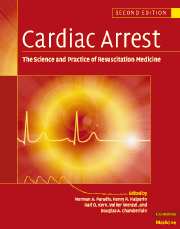Book contents
- Frontmatter
- Contents
- List of contributors
- Foreword
- Preface
- Part I Introduction
- Part II Basic science
- 3 Global cellular ischemia/reperfusion during cardiac arrest: critical stress responses and the postresuscitation syndrome
- 4 Genetics, genomics and proteomics in sudden cardiac death
- 5 Intracellular signaling during myocardial ischemia
- 6 Electrophysiology of ventricular fibrillation and defibrillation
- 7 The neuroendocrine response to global ischemia and reperfusion
- 8 Inflammatory and Immunologic responses to ischemia and reperfusion
- 9 Methodology of laboratory resuscitation research
- 10 The methodology of clinical resuscitation research
- 11 The special problem of consent for resuscitation research
- Part III The pathophysiology of global ischemia and reperfusion
- Part IV Therapy of sudden death
- Part V Postresuscitation disease and its care
- Part VI Special resuscitation circumstances
- Part VII Special issues in resuscitation
- Index
8 - Inflammatory and Immunologic responses to ischemia and reperfusion
from Part II - Basic science
Published online by Cambridge University Press: 06 January 2010
- Frontmatter
- Contents
- List of contributors
- Foreword
- Preface
- Part I Introduction
- Part II Basic science
- 3 Global cellular ischemia/reperfusion during cardiac arrest: critical stress responses and the postresuscitation syndrome
- 4 Genetics, genomics and proteomics in sudden cardiac death
- 5 Intracellular signaling during myocardial ischemia
- 6 Electrophysiology of ventricular fibrillation and defibrillation
- 7 The neuroendocrine response to global ischemia and reperfusion
- 8 Inflammatory and Immunologic responses to ischemia and reperfusion
- 9 Methodology of laboratory resuscitation research
- 10 The methodology of clinical resuscitation research
- 11 The special problem of consent for resuscitation research
- Part III The pathophysiology of global ischemia and reperfusion
- Part IV Therapy of sudden death
- Part V Postresuscitation disease and its care
- Part VI Special resuscitation circumstances
- Part VII Special issues in resuscitation
- Index
Summary
Introduction
Despite advances in the treatment of cardiac arrest, the development of organ dysfunction following return of spontaneous circulation causes considerable morbidity and mortality. The complex pathophysiologic mechanisms underlying this postresuscitation syndrome likely result from global ischemia, reperfusion, and the triggering of a profound systemic inflammatory response syndrome. To understand such mechanisms and to improve therapy for victims of cardiac arrest, it is essential to identify the principal mediators that contribute to this disease process, and to identify their roles in the development of organ dysfunction. By understanding the roles of key inflammatory and immunologic mediators during the resuscitation and postresuscitation periods, it may be possible to improve understanding of the whole-body response to ischemia and reperfusion, and to develop effective therapeutic strategies for patients who suffer cardiac arrest and for those who achieve return of spontaneous circulation.
Systemic inflammatory response
The pathophysiology of cardiac arrest is complex and, like sepsis, induces a profound systemic inflammatory response syndrome. Unlike sepsis, however, the systemic inflammatory response syndrome following cardiac arrest results from whole-body ischemia (i.e., low or noflow) and reperfusion (i.e., restoration of flow following ischemia). The development of a systemic inflammatory response syndrome has been divided into three stages. The first stage occurs in response to an insult, resulting in a local cytokine response primarily intended to evoke an inflammatory response to promote local cellular repair by recruiting cells from the reticuloendothelial and immune systems. The second stage involves release of small quantities of cytokines into the systemic circulation in order to enhance, or magnify, this local response. This acute-phase response is usually tightly controlled by endogenous proinflammatory antagonists, and cytokines and immunologic mediators are kept in check by specific downregulation and antagonism.
- Type
- Chapter
- Information
- Cardiac ArrestThe Science and Practice of Resuscitation Medicine, pp. 163 - 178Publisher: Cambridge University PressPrint publication year: 2007
- 1
- Cited by



